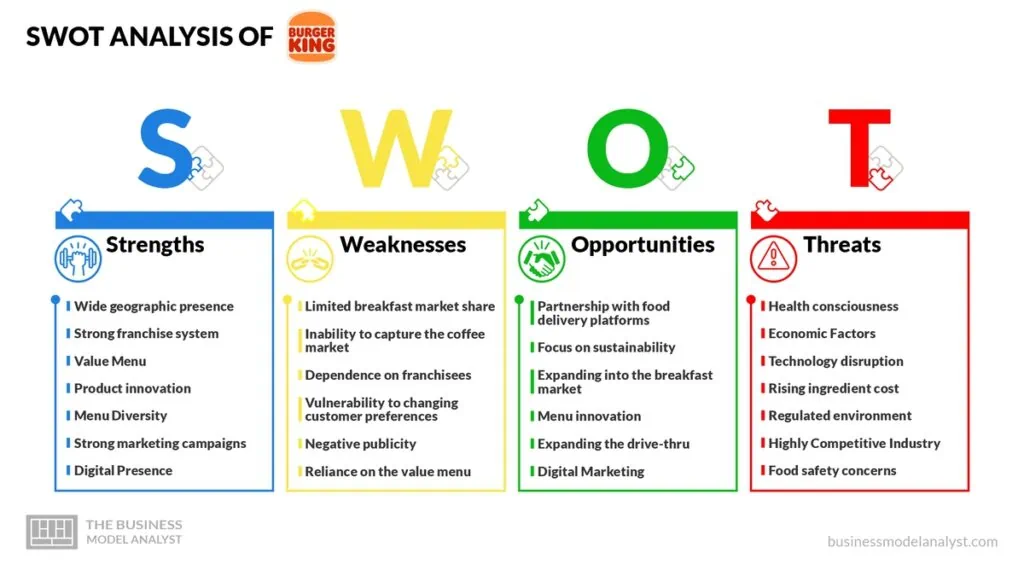Burger King, one of the world’s most iconic fast-food chains, was founded in 1954 by James McLamore and David Edgerton. The first Burger King restaurant opened in Miami, Florida, USA, and since then, it has grown to become a global brand with thousands of branches worldwide.
The company has over 18,700 restaurants in more than 100 countries, employing a vast workforce of thousands of employees. It is best known for its flame-grilled burgers, which have become its signature product, alongside a diverse menu offering a range of sandwiches, sides, and beverages.
Burger King has had its share of successes and failures. For instance, it pioneered the concept of the Whopper burger, establishing a solid global presence and adopting innovative marketing campaigns, such as the memorable “Have It Your Way” slogan. However, the company has faced challenges over the years, including intense competition from rival fast-food chains and criticism for its nutritional content and environmental impact.
Over time, Burger King has sought to adapt to changing consumer preferences by introducing plant-based burger options and exploring delivery services and digital technologies to enhance the customer experience. Despite challenges, Burger King remains an influential player in the fast-food industry, constantly striving to evolve and meet the demands of its diverse customer base.
Below, there is a detailed Burger King SWOT Analysis to better understand its strengths, weaknesses, opportunities, and threats in the global market.
Contents
Burger King Strengths
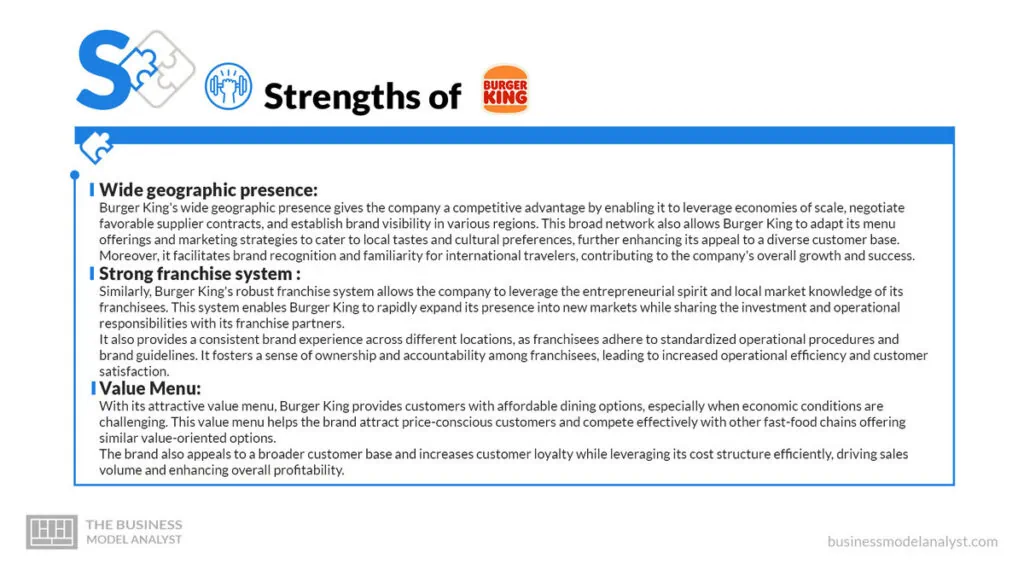
Burger King’s strengths majorly lie in its ability to evolve and meet the needs of its diverse customer base. Below, there are more details about the company’s strengths:
Wide geographic presence
Burger King’s wide geographic presence gives the company a competitive advantage by enabling it to leverage economies of scale, negotiate favorable supplier contracts, and establish brand visibility in various regions. This broad network also allows Burger King to adapt its menu offerings and marketing strategies to cater to local tastes and cultural preferences, further enhancing its appeal to a diverse customer base. Moreover, it facilitates brand recognition and familiarity for international travelers, contributing to the company’s overall growth and success.
Strong franchise system
Similarly, Burger King’s robust franchise system allows the company to leverage the entrepreneurial spirit and local market knowledge of its franchisees. This system enables Burger King to rapidly expand its presence into new markets while sharing the investment and operational responsibilities with its franchise partners.
It also provides a consistent brand experience across different locations, as franchisees adhere to standardized operational procedures and brand guidelines. It fosters a sense of ownership and accountability among franchisees, leading to increased operational efficiency and customer satisfaction.
Value Menu
With its attractive value menu, Burger King provides customers with affordable dining options, especially when economic conditions are challenging. This value menu helps the brand attract price-conscious customers and compete effectively with other fast-food chains offering similar value-oriented options.
The brand also appeals to a broader customer base and increases customer loyalty while leveraging its cost structure efficiently, driving sales volume and enhancing overall profitability.
Product innovation
The company’s commitment to product innovation allows it to stay ahead of the competition and maintain its appeal to customers. By regularly introducing new and unique menu items, Burger King keeps its menu fresh and exciting, encouraging customers to try new offerings and revisit the restaurant.
This also helps the brand capture the attention of younger consumers, who often seek novel and unconventional dining experiences. Moreover, it allows the company to generate buzz and media attention, boosting its brand awareness and attracting new customers.
Menu Diversity
With a menu diversity catering to a wide range of customer preferences, the company ensures something for everyone. By offering options beyond burgers, such as chicken sandwiches, salads, and breakfast items, Burger King attracts a broader customer base and appeals to individuals with different dietary choices or restrictions.
The menu diversity also allows Burger King to capitalize on trends and shifts in consumer preferences, such as the growing demand for plant-based alternatives, by introducing innovative offerings like the Impossible Whopper.
Strong marketing campaigns
Another strength of Burger King is its strong marketing campaigns that played a crucial role in establishing its brand identity and creating its distinct personality in the fast-food industry. The company has been known for its creative and often unconventional marketing strategies, generating significant buzz and capturing consumers’ attention.
These successful campaigns, such as the “Whopper Detour” and “Moldy Whopper,” have not only increased brand awareness, but also engaged consumers on social media platforms and generated valuable word-of-mouth publicity.
Digital Presence
Its embrace of digital technologies and platforms has revolutionized the customer experience by providing convenient and efficient ways to interact with the brand. The introduction of mobile apps and online ordering systems allows customers to easily browse the menu, customize their orders, and make payments, all from the comfort of their own devices.
This digital presence enhances convenience and provides opportunities for personalized marketing, loyalty programs, and targeted promotions, further strengthening customer engagement and fostering brand loyalty.
Customization option
Burger King’s “Have It Your Way” concept sets it apart from many other fast-food chains, offering customers the freedom to personalize their meals according to their preferences and dietary needs.
Asides from enhancing customer satisfaction, the customization option also allows Burger King to cater to a diverse range of tastes and accommodate various dietary restrictions. It fosters a sense of ownership and individuality in the dining experience, contributing to increased customer loyalty and positive word-of-mouth recommendations.
Fast service
Fast service is a significant strength that enhances customer satisfaction and convenience, especially in the fast-paced nature of the fast-food industry. The brand’s ability to efficiently deliver meals to customers allows them to cater to individuals seeking a quick and easy dining experience. The quick service also contributes to positive brand perception, encouraging repeat visits and word-of-mouth recommendations from satisfied customers.
Strong brand perception
Strong brand recognition is a valuable asset, contributing to market presence and customer loyalty. Burger King’s iconic logo, slogans, and memorable advertising campaigns have contributed to its widespread recognition and recall among consumers. The familiarity of the Burger King brand helps drive foot traffic to its outlets, and encourages customers to choose Burger King over competitors due to the trust and familiarity associated with the brand.
Burger King Weaknesses
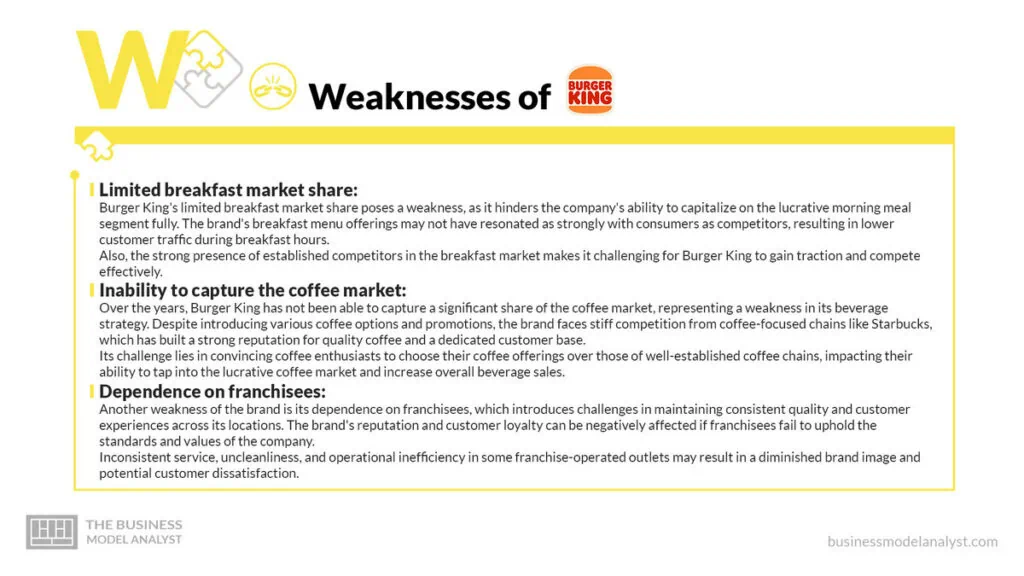
Despite its strengths, Burger King has some drawbacks, such as:
Limited breakfast market share
Burger King’s limited breakfast market share poses a weakness, as it hinders the company’s ability to capitalize on the lucrative morning meal segment fully. The brand’s breakfast menu offerings may not have resonated as strongly with consumers as competitors, resulting in lower customer traffic during breakfast hours.
Also, the strong presence of established competitors in the breakfast market makes it challenging for Burger King to gain traction and compete effectively.
Inability to capture the coffee market
Over the years, Burger King has not been able to capture a significant share of the coffee market, representing a weakness in its beverage strategy. Despite introducing various coffee options and promotions, the brand faces stiff competition from coffee-focused chains like Starbucks, which has built a strong reputation for quality coffee and a dedicated customer base.
Its challenge lies in convincing coffee enthusiasts to choose their coffee offerings over those of well-established coffee chains, impacting their ability to tap into the lucrative coffee market and increase overall beverage sales.
Dependence on franchisees
Another weakness of the brand is its dependence on franchisees, which introduces challenges in maintaining consistent quality and customer experiences across its locations. The brand’s reputation and customer loyalty can be negatively affected if franchisees fail to uphold the standards and values of the company.
Inconsistent service, uncleanliness, and operational inefficiency in some franchise-operated outlets may result in a diminished brand image and potential customer dissatisfaction.
Vulnerability to changing customer preferences
The company’s vulnerability to changing consumer preferences puts the company at risk of losing relevance in the market. As consumers increasingly prioritize healthier food options and conscious eating habits, Burger King’s traditional fast-food offerings may face declining demand.
Failure to adapt its menu to accommodate evolving trends, such as incorporating more plant-based options, or healthier alternatives, could result in decreased customer interest and potential loss of market share to competitors that cater to these changing preferences.
Negative publicity
Burger King’s negative publicity and controversies pose a weakness, as they can erode customer trust and loyalty. Criticisms related to misleading or controversial advertising campaigns, allegations of unfair labor practices, or concerns about environmental sustainability can harm the brand’s reputation. Negative public perception may lead to a decline in customer patronage and potential loss of market share to competitors with more favorable public images.
Reliance on the value menu
The brand’s reliance on its value menu is a weakness that limits the company’s ability to generate higher profit margins from premium-priced items. The emphasis on low-priced offerings may also hinder the brand’s ability to invest in innovation and the use of higher-quality ingredients, potentially compromising the overall quality of the menu.
Furthermore, a heavy reliance on value menu items may make it challenging for Burger King to position itself as a premium or higher-end fast-food option, limiting its appeal to specific market segments.
Inconsistent International Performance
The company’s inconsistent international performance challenges market penetration and sustained growth in diverse global markets. Adapting to local tastes and preferences can result in additional costs and complexities in product development, marketing, and operations.
In some cases, Burger King may face stiff competition from local fast-food chains with a stronger foothold and a better understanding of the local market dynamics.
Limited vegan options
In recent years, there has been a significant shift in consumer preferences towards vegetarian and vegan diets, driven by concerns for animal welfare, health, and environmental sustainability. Burger King’s limited vegetarian and vegan options can be seen as a weakness, as it may alienate a growing segment of customers actively seeking plant-based alternatives.
Even though the brand has tried to introduce some vegetarian and vegan menu items, such as the Impossible Whopper and plant-based nuggets, there is still room for expansion. It can invest in more robust vegetarian and vegan offerings, attract a broader customer base, and better cater to the changing dietary preferences of consumers.
Burger King Opportunities
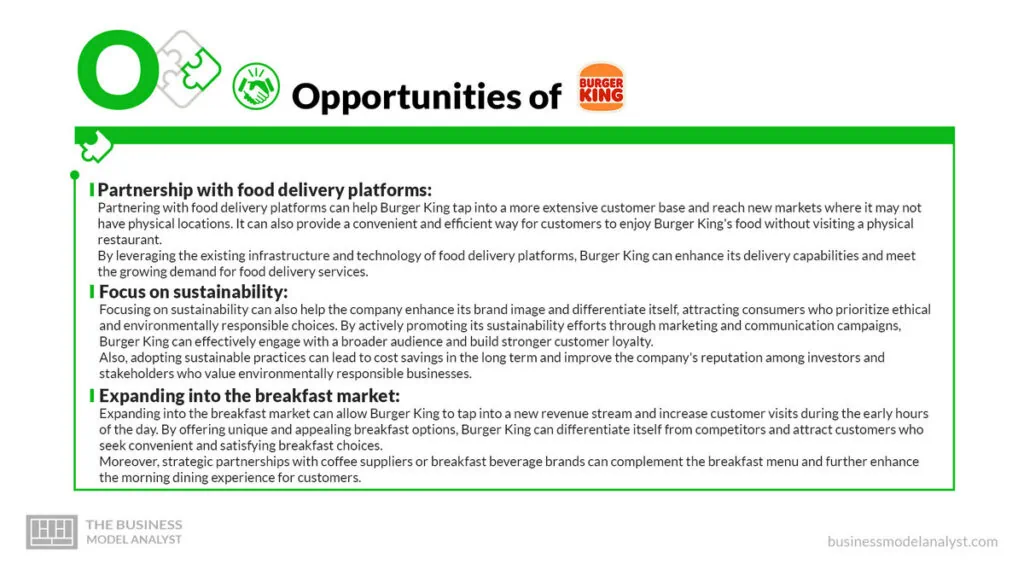
Below, there are some growth opportunities that Burger King can take advantage of to strengthen its market position and increase its market share:
Partnership with food delivery platforms
Partnering with food delivery platforms can help Burger King tap into a more extensive customer base and reach new markets where it may not have physical locations. It can also provide a convenient and efficient way for customers to enjoy Burger King’s food without visiting a physical restaurant.
By leveraging the existing infrastructure and technology of food delivery platforms, Burger King can enhance its delivery capabilities and meet the growing demand for food delivery services.
Focus on sustainability
Focusing on sustainability can also help the company enhance its brand image and differentiate itself, attracting consumers who prioritize ethical and environmentally responsible choices. By actively promoting its sustainability efforts through marketing and communication campaigns, Burger King can effectively engage with a broader audience and build stronger customer loyalty.
Also, adopting sustainable practices can lead to cost savings in the long term and improve the company’s reputation among investors and stakeholders who value environmentally responsible businesses.
Expanding into the breakfast market
Expanding into the breakfast market can allow Burger King to tap into a new revenue stream and increase customer visits during the early hours of the day. By offering unique and appealing breakfast options, Burger King can differentiate itself from competitors and attract customers who seek convenient and satisfying breakfast choices.
Moreover, strategic partnerships with coffee suppliers or breakfast beverage brands can complement the breakfast menu and further enhance the morning dining experience for customers.
Menu innovation
Another opportunity is menu innovation that can help Burger King stay relevant and attract more customers. By introducing plant-based options, Burger King can cater to the increasing demand for vegetarian and vegan choices, appealing to health-conscious consumers.
Furthermore, offering healthier alternatives and customizable menu items can provide greater flexibility for customers with specific dietary needs and preferences, enhancing their dining experience. Maintaining changing consumer trends and preferences through menu innovation can increase customer satisfaction and loyalty.
Expanding the drive-thru
Expanding the drive-thru and takeaway formats can offer customers a convenient and efficient dining experience, especially in today’s fast-paced world. By investing in drive-thru technology and optimizing the ordering and pickup process, the company can reduce wait times and improve overall customer satisfaction.
More so, enhancing the packaging and presentation of takeaway meals can ensure that the food remains fresh and enjoyable for customers who prefer to dine at their convenience.
Digital Marketing
Embracing digital marketing and social media can allow Burger King to reach a wider audience, especially younger demographics, who are highly active on various online platforms. By crafting engaging and shareable content, the company can create a sense of community and interaction with its customers, fostering brand loyalty and advocacy. Utilizing social media channels for promotions, contests, and limited-time offers can drive traffic to its outlets and increase sales.
Global Partnerships
Exploring global partnerships with established brands can allow Burger King to tap into new customer segments and enhance its overall appeal. Collaborating with beverage companies could lead to exclusive beverage offerings or promotions, while partnerships with snack manufacturers might result in unique menu items or limited-edition products.
Moreover, teaming up with technology companies could help Burger King integrate innovative digital solutions into its operations, further enhancing customer convenience and engagement. Such strategic partnerships can boost Burger King’s competitive edge and open up new avenues for growth in the dynamic fast-food industry.
Burger King Threats
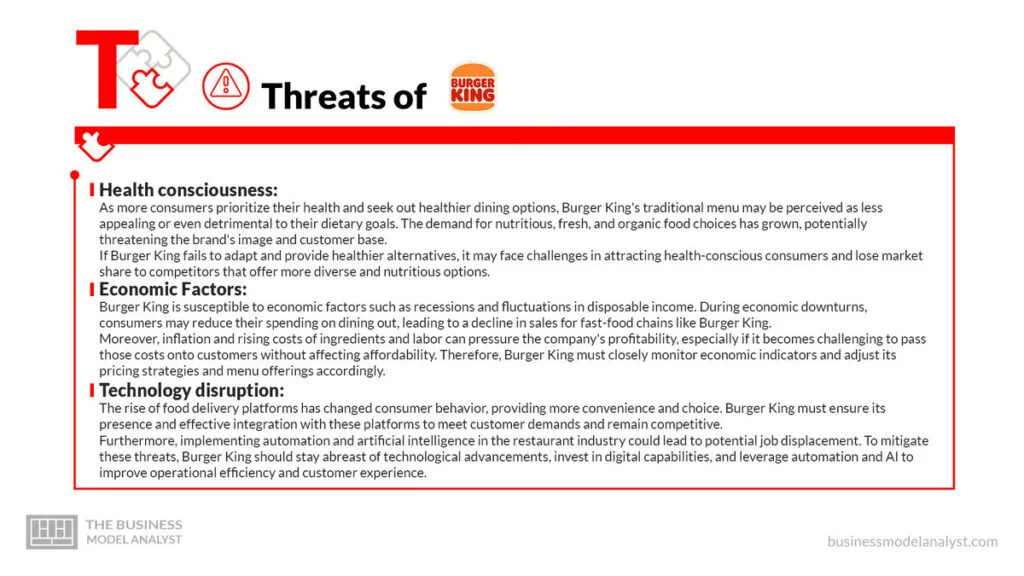
Below, there are some of the threats Burger King needs to tackle to maintain its progress in the industry:
Health consciousness
As more consumers prioritize their health and seek out healthier dining options, Burger King’s traditional menu may be perceived as less appealing or even detrimental to their dietary goals. The demand for nutritious, fresh, and organic food choices has grown, potentially threatening the brand’s image and customer base.
If Burger King fails to adapt and provide healthier alternatives, it may face challenges in attracting health-conscious consumers and lose market share to competitors that offer more diverse and nutritious options.
Economic Factors
Burger King is susceptible to economic factors such as recessions and fluctuations in disposable income. During economic downturns, consumers may reduce their spending on dining out, leading to a decline in sales for fast-food chains like Burger King.
Moreover, inflation and rising costs of ingredients and labor can pressure the company’s profitability, especially if it becomes challenging to pass those costs onto customers without affecting affordability. Therefore, Burger King must closely monitor economic indicators and adjust its pricing strategies and menu offerings accordingly.
Technology disruption
The rise of food delivery platforms has changed consumer behavior, providing more convenience and choice. Burger King must ensure its presence and effective integration with these platforms to meet customer demands and remain competitive.
Furthermore, implementing automation and artificial intelligence in the restaurant industry could lead to potential job displacement. To mitigate these threats, Burger King should stay abreast of technological advancements, invest in digital capabilities, and leverage automation and AI to improve operational efficiency and customer experience.
Rising ingredient cost
Fluctuating ingredient costs can challenge Burger King in maintaining consistent pricing and profitability, as it may need to adjust menu prices or seek alternative sourcing options. Besides this, supply chain disruptions or shortages of key ingredients can further exacerbate the impact on operations.
As such, Burger King can explore strategic partnerships with suppliers, implement effective cost management strategies, and focus on menu engineering to optimize ingredient usage and minimize waste.
Regulated environment
Burger King operates in a highly regulated industry, and changes in regulations can impact its operations, marketing practices, and overall business strategies. Compliance with health and safety standards, including food handling and preparation regulations, is crucial to maintain consumer trust and prevent potential legal issues.
Asides from this, advertising restrictions and labor laws can affect Burger King’s ability to market its products effectively and manage its workforce efficiently. Staying updated on regulatory changes and proactively adapting policies and procedures are essential for Burger King to navigate the complex regulatory environment successfully.
Highly Competitive Industry
As a highly competitive industry, Burger King’s competitors continuously strive to attract customers with aggressive marketing, new menu offerings, and promotional deals. McDonald’s, one of the largest fast-food chains globally, presents a formidable rival and has a strong presence in many markets where Burger King operates.
Wendy’s and Taco Bell are also strong competitors, with their distinct menu offerings and targeted marketing strategies. For this reason, Burger King must remain vigilant and innovate, ensuring it differentiates itself through unique offerings, customer engagement, and strategic marketing initiatives to maintain and grow its market share.
Food safety concerns
Food safety concerns significantly threaten Burger King’s brand image and customer loyalty. Any reported cases of foodborne illnesses or contamination can lead to negative media coverage, widespread public scrutiny, and potential legal repercussions.
In light of this, Burger King must maintain stringent food safety protocols, ensure proper training of employees, and be transparent with customers about its commitment to food safety measures.
Regular inspections and audits across its outlets can help identify and rectify any potential risks, further safeguarding the company’s reputation and ensuring customer confidence in its products.
Conclusion
In conclusion, Burger King is a prominent player in the fast-food industry, with a rich history and a solid global presence. The company’s strengths, such as its broad geographic footprint, robust franchise system, and innovative menu offerings, have contributed to its success.
However, it also faces several challenges, including adapting to changing consumer preferences, competition in the breakfast market, and negative publicity and controversies. To capitalize on opportunities and address threats, Burger King can focus on expanding its digital presence, enhancing sustainability efforts, and continually innovating its menu to cater to evolving customer demands.
Embracing partnerships, technological advancements, and menu diversification are vital strategies to stay competitive in the ever-changing fast-food landscape. By carefully navigating these opportunities and challenges, Burger King can continue to thrive and build upon its reputation as one of the world’s leading fast-food chains.


